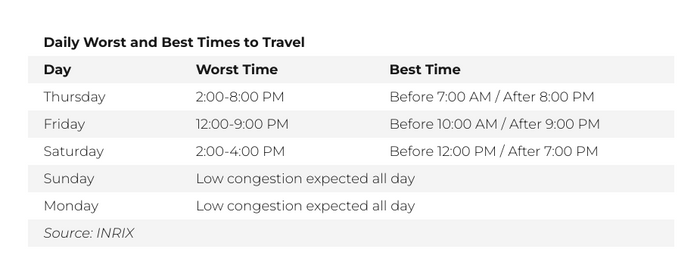Millions of Americans will be driving from sea to shining sea over the Fourth of July weekend, historically high gas prices be damned!
That’s according to AAA’s Independence Day travel forecast, which expects a record 42 million people to hit the road during the holiday weekend spanning June 30 to July 4, even as national gas prices are currently averaging around $5 per gallon.
And some observers suggest that gas could hit $6 a gallon by the end of the summer — but it’s not pumping the breaks on Fourth of July road trips, it seems. (Plus, gas prices eased up a bit heading into the holiday weekend.)
Opinion: Gas prices are headed to $6 by Labor Day — here are the main reasons why
In fact, AAA called the projected number of Fourth of July weekend road-trippers “the biggest surprise” of its holiday weekend report.
“The volume of travelers we expect to see over Independence Day is a definite sign that summer travel is kicking into high gear,” said Paula Twidale, senior vice president of AAA Travel, in a statement.
“Earlier this year, we started seeing the demand for travel increase and it’s not tapering off,” she continued. “People are ready for a break and despite things costing more, they are finding ways to still take that much needed vacation.”
Drivers told Cars.com that they’re mitigating the pain at the pump by taking trips that are closer to home, or bringing more friends and family along to chip in for gas.
The AAA report suggested that recent issues with air travel could be driving more Americans to — well, drive. Thousands of flights were canceled or delayed over the busy Juneteenth and Father’s Day holiday weekend, after all. And in May, U.S. airlines were canceled hundreds of flights over Memorial Day weekend due to a perfect storm of severe weather and staffing challenges that disrupted travel.
In fact, Delta
DAL,
has preemptively issued a July 4 travel waiver good through July 8 to allow customers to rebook their Fourth of July weekend flights without paying any change fees or airfare differences. “We are providing more flexibility to customers for making changes to their flight schedule ahead of the busy July 4th holiday weekend as we expect to carry customer volumes over the weekend not seen since before the pandemic,” the airline said in a statement.
The airfare analysts at travel booking site Hopper have also warned that this long Fourth of July weekend will be the “busiest and most expensive travel weekend in years,” with domestic airfare averaging $437 per round trip ticket, up 45% compared to 2019. High demand, surging fuel prices, as well as a shortage of pilots and staffing at some air traffic control centers are all factors contributing to the higher ticket prices, canceled flights and delays.
July 4 forecast: Inflation is raising the cost of summer BBQs by 17% to $70 on average, before alcohol
But that being said, plenty of Americans are also expected to hit the skies. AAA predicts 47.9 million people overall will travel 50 miles or more from home over the holiday weekend, which is up 3.7% over 2021, and just shy of the travel volumes seen in 2019. Some 3.55 million Americans are expected to travel by plane, while 2.42 million will journey by bus, train or cruise, according to AAA. And airlines have said that they are expecting record travel this summer.
Still, 88% of travelers are expected to hit the road. The busiest days are expected to be Thursday afternoon (June 30) and Friday (July 1) as people clock out of work early and head out for the weekend.
“We expect nationwide travel times to increase about 50% compared to normal,” warned Bob Pishue, transportation analyst at INRIX, which provides location-based data and analytics. “Drivers around major metro areas must be prepared for significantly more delays.”
He says to avoid traveling on Thursday and Friday afternoon, if possible, to avoid the worst traffic. The best time to drive will be on Sunday, July 3, and Monday, July 4, when low congestion is expected all day. So those celebrating closer to home may want to travel closer to July 4, or on the holiday, itself, to catch the least amount of traffic.
Monday, July 4, is expected to be the lightest travel day, according to AAA.

The AAA Independence Day travel forecast with INRIX predicts these will be the best and worst days and times to travel during the July 4 weekend.
AAA
“Everything about the Fourth is building up to the fireworks, which culminates July 4 evening at 9:30 at night. We suspect that probably a lot of folks are just extending this holiday into the next day [Tuesday, July 5]” — which is when they’ll drive home, Andrew Gross, an AAA Inc. representative, told MarketWatch.
“The holiday-day is often the least traveled,” he continued. “Thanksgiving would be the least-traveled day over Thanksgiving weekend, for example. So on July 4, everyone has already gotten to where they’re going for the Fourth. Everything is culminating that night.”
AAA also breaks down the worst metro area roadways and times to travel — such as the I-5 South in Los Angeles (from Colorado Street to Florence Avenue) on Friday, July 1 between 4:15 and 6:15 p.m., when travel times will be 147% over normal. Or peak traffic volume will hit New York’s Belt Parkway (from W. Cohancy Street to I-278) on Saturday between 10:30 a.m. and 12:30 p.m., when travel times will be 142% over normal.
